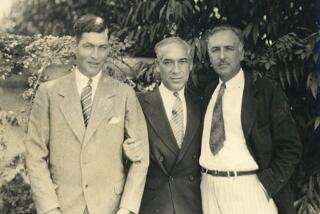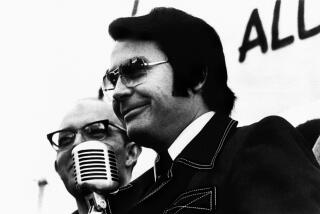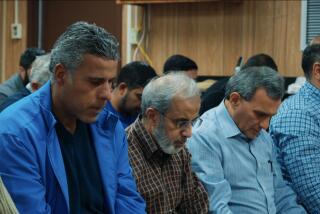Cultural Exchange: The world cottons to ‘Little Mosque on the Prairie’
— The land of hockey, toques and the apology. Cast your eye a little farther down the list of things Canada has given the world (past zippers, Jolly Jumpers and five-pin bowling but well before Céline Dion) and you come to Canadian television.
There was “The Beachcombers,” “Due South,” “Kids in the Hall” and “Road to Avonlea,” but unlike Australia, the U.K. or Quebec, which have thriving industries, English Canada’s approach to homegrown programming has been more tortoise than hare.
Happily, the fortunes of Canada’s television have improved with the success of “Trailer Park Boys,” a mockumentary about life in a Nova Scotia trailer park, middle-of-nowehere comedy “Corner Gas” and co-production “The Tudors.” The show that has been the calling card for the possibilities of Canadian TV, however, is “Little Mosque on the Prairie.”
“Mosque” was conceived in the wake of the 2005 Danish Muhammad cartoon crisis by producer Mary Darling, her husband, Clark Donnelly, and writer Zarqa Nawaz when they met at the Banff Television Festival. The basic premise was: What would it look like if a Muslim born and raised in Canada became an imam?
As the concept developed further, the conceit became a second-generation Canadian imam from Toronto arrives at his post to discover the mosque is in the parish hall of the local Anglican church. Culture clash and its resultant hilarity ensue.
Mercy, the fictional small Saskatchewan town in which “Mosque” is set, is populated by characters designed to play with our ideas of Other. The liberal imam is ex-lawyer Amaar Rashid. He eventually marries Rayyad Hamoudi, whose parents, Sarah and Yasir, also live in town. Sarah converted to Islam to marry Yasir. Completing the main cast is Fred Tupper, a shock jock radio DJ/bigot; Fatima Dinssa, a conservative Nigerian Muslim who owns a popular cafe in town; Baber Siqqidi, the local grump; and the mayor, Anne Popowicz, who doesn’t care what anybody does as long as it results in less work for her.
The humor is deliberately gentle — more “Vicar of Dibley” than “Twin Peaks.” Explained Darling, “We wanted the show to also have heart, kind of like Archie Bunker exploring racism in America. Comedy dilates the heart and makes things more palpable.” The general rule for the show’s writers is that they never make fun of the sacred center of either faith.
For Nawaz, exploring the issues in her community was more important than creating something purposely controversial. The widely held view that Muslims are humorless pedants just didn’t connect with Nawaz’s experience as a second-generation Canadian Muslims. Showing that modern Muslims are self-aware and can laugh at themselves has been a big part of “Mosque’s” success. The program drew 2 million viewers for its first episode, and an average of 1 million for the rest of its first season.
In an episode titled “Jihad on Ice,” viewers find the answer to the question on the nation’s lips: Can Muslims curl? It turns out they can. And rather well at that.
All Canadian television networks are required to have at least 60% of their content produced in Canada, but most get around it by counting news broadcasts, reality shows and daytime television programming. The rest of the time is filled with shows from the U.S. such as “Grey’s Anatomy and “Dancing with the Stars” “Mosque” is broadcast on Canada’s national public broadcaster. The CBC is different from PBS in that it is supported directly by the government and therefore obligated to create programming that reflects Canadian culture.
“I think the show talks about the success of multiculturalism in Canada and integration,” Nawaz said. She grew up in Toronto in the 1970s with parents who immigrated from Pakistan via Britain. “I am a Canadian of Muslim faith. I don’t have a chip on my shoulder. No one cared if I wanted to pray five times a day or wear a hijab. I could just do my own thing.”
The genius of “Mosque” is that the characters resonate with viewers all over the world. The show is broadcast in 83 countries, including the United Arab Emirates and Turkey; the format was sold to 20th Century Fox in 2008 for a U.S. remake but nothing came of it. Nawaz’s explanation: “We didn’t have 9/11, and we have a public broadcaster. 9/11 affected the American psyche in a major way, and you have to be sensitive to that.”
Last autumn Canadian-American relations were put to the test courtesy of Wikileaks. It seems an unnamed U.S. diplomat posted in Ottawa found the show “noteworthy as an indication of the kind of insidious negative popular stereotyping we are increasingly up against in Canada.” The incident in question? Baber, the town grump, runs into a “rude and eccentric” U.S. consular officer while trying to get his name off the no-fly list. Although treated as a matter of amusement in the Canadian press, it was enough to prompt Secretary of State Hillary Clinton to write “Mosque” producers a letter praising the show for fostering cross-cultural unity.
Filming of the sixth season is beginning this spring, and although ratings are lower than they were in the first season, they are holding steady at 500,000, considered good here. Against all odds, this gentle, occasionally earnest show is well loved by Canadians and Americans living close enough to the border. “A comedy about a mosque in the middle of the prairie being a success?” said Nawaz. “No one saw that coming.”
More to Read
The biggest entertainment stories
Get our big stories about Hollywood, film, television, music, arts, culture and more right in your inbox as soon as they publish.
You may occasionally receive promotional content from the Los Angeles Times.






